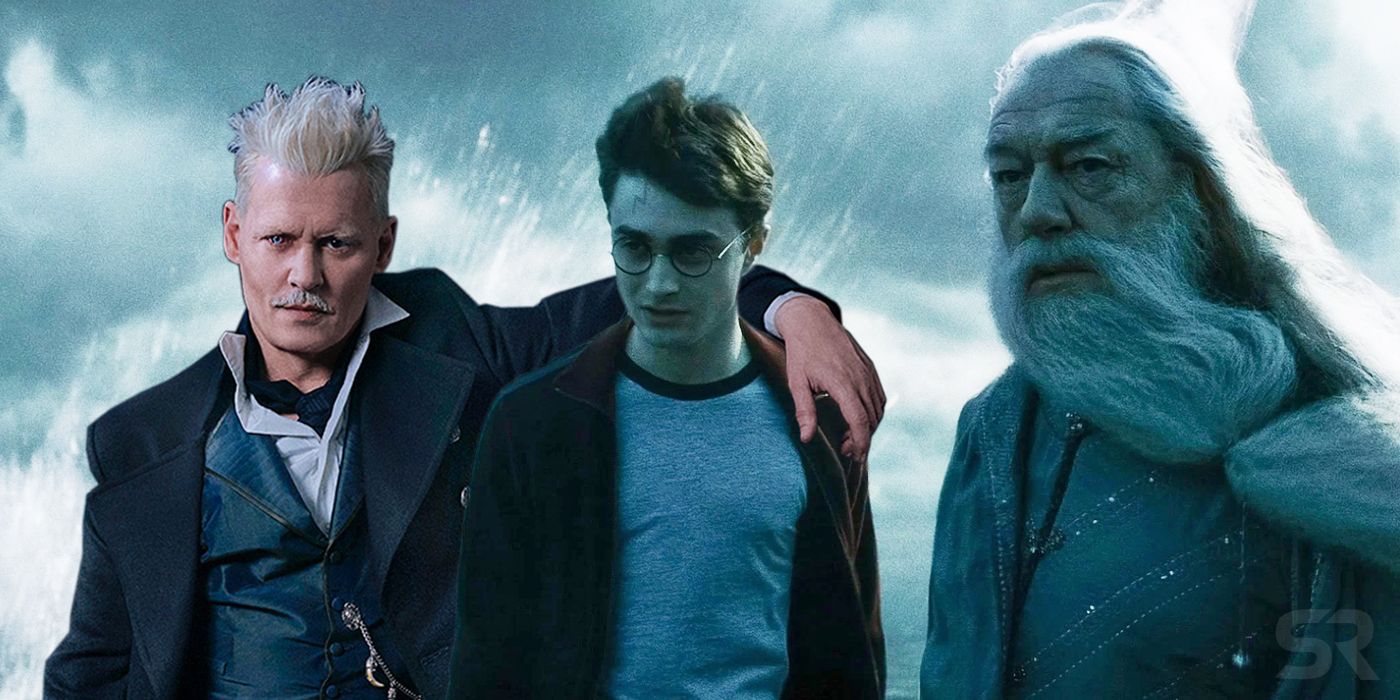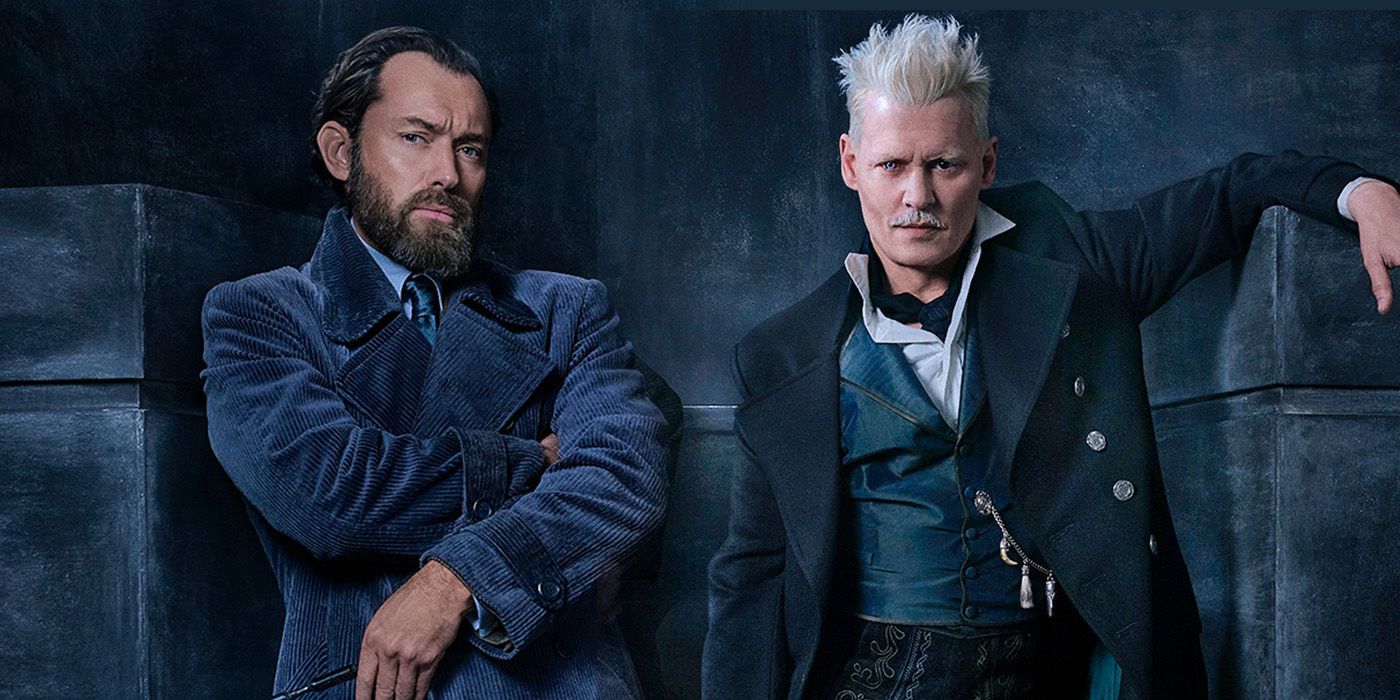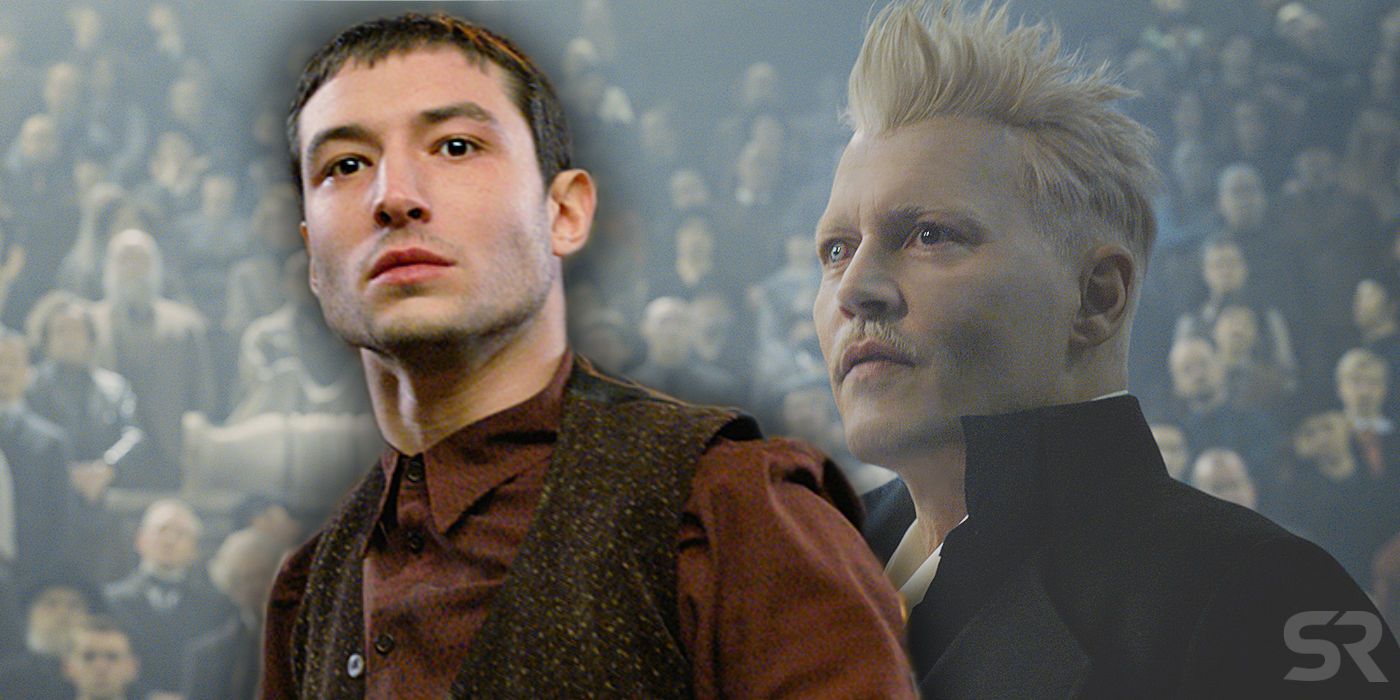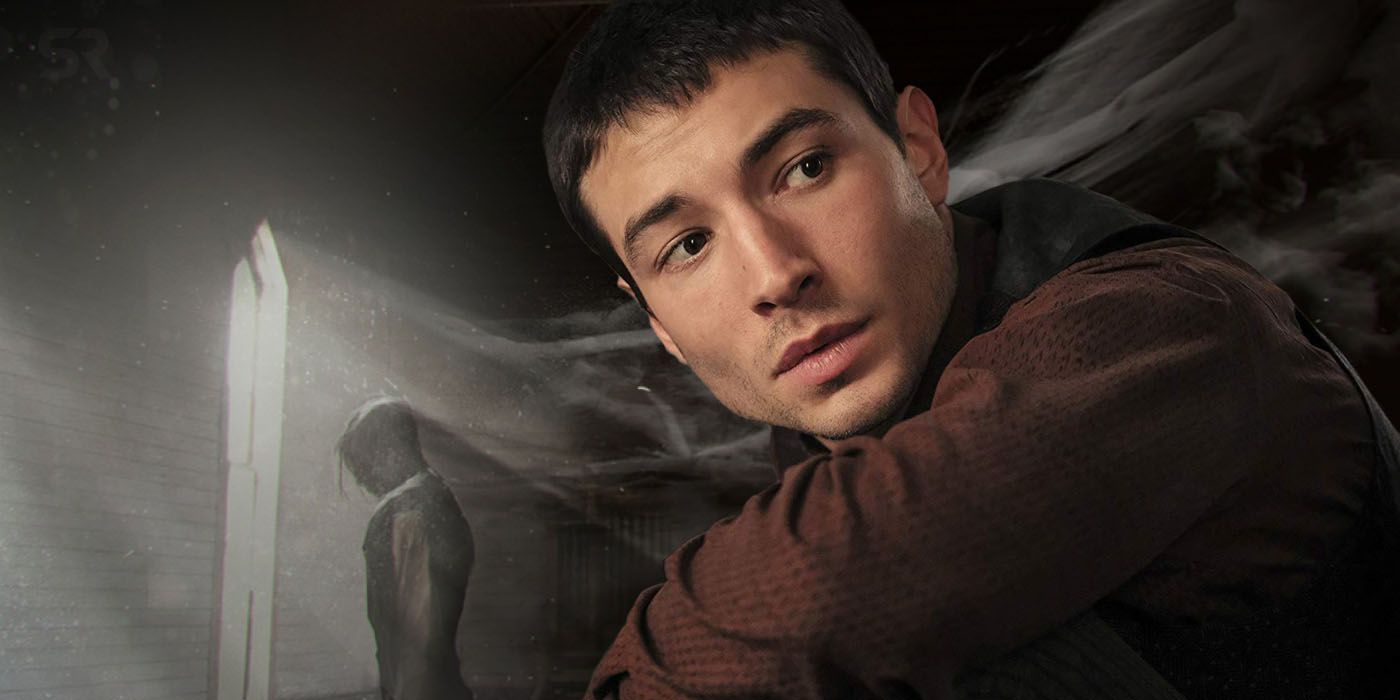Fantastic Beasts: The Crimes of Grindelwald has teased a fascinating possibility, that everything Harry Potter fans know Dumbledore's legendary defeat of Grindelwald is a lie. Albus Dumbledore has always been presented as a secretive man, manipulating those around him and carefully keeping his own counsel. In the aftermath of his death, Harry Potter was horrified when tabloid journalist Rita Skeeter published a biography of his beloved mentor, in which she revealed countless secrets that Dumbledore had hidden for decades. The Fantastic Beasts films have already confirmed that Dumbledore still had a lot more secrets as well, not least being the Blood Pact that explained why he didn't battle Grindelwald in The Crimes of Grindelwald.
There's a sense in which the Fantastic Beasts franchise is telling a story audiences thought they already knew; Grindelwald is a known figure in the Harry Potter/Fantastic Beasts timeline, destined to be defeated in 1945 in a legendary battle with Dumbledore. And yet, Rowling has gone to great effort to ensure the story remains surprising. Credence's very existence is a curveball in this narrative, unexpected and unpredictable. The films promise to continue to focus upon Newt Scamander and his friends, with Dumbledore as a background character rather than the star of the show. There's something very strange about the setup. It's causing many to complain in confusion, but franchise star Ezra Miller has assured viewers that they should trust Rowling.
Related: Fantastic Beasts 2 IMPROVED Harry Potter Canon
Given the Fantastic Beasts franchise is headed in an unexpected direction, it's important for fans to question everything they thought they knew. The history of Albus Dumbledore appears to be like a Russian nesting doll; every time people think they know the truth about the man, they open up the doll and find themselves confronted with a new truth. Is that even the case with what fans thought were established facts? Specifically - will Albus Dumbledore be the one to defeat Gellert Grindelwald after all, or was he simply lying about the story all along?
- This Page: Everything We Know About Grindelwald's Defeat
- Next Page: Could Credence Be The One Who Truly Defeated Grindelwald?
What We Know About Grindelwald's Defeat
The dark wizard Grindelwald was first mentioned on Dumbledore's Chocolate Frog card in Harry Potter and the Philosopher's Stone. It was only a brief mention, but it established that Grindelwald will ultimately be defeated in 1945. Dumbledore's triumph is credited as one of the greatest achievements of his life, alongside his discovery of the twelve uses of dragon's blood and his work on alchemy with Nicolas Flamel. That was the sole mention of Grindelwald until Harry Potter and the Deathly Hallows, which saw Rita Skeeter investigate Dumbledore's history in the wake of his death. Skeeter discovered that Albus Dumbledore and Gellert Grindelwald were once close friends, and that the young Dumbledore even shared Grindelwald's philosophy for a time. It was ultimately revealed that the two bonded in their shared obsession over the Elder Wand and the Deathly Hallows, but parted ways in a violent altercation that led to the death of Albus' sister, Ariana.
In a mystical experience, Albus Dumbledore explained to Harry Potter that his past ties to Grindelwald had made him reluctant to intervene as Grindelwald drew all Europe into war. It was only in 1945 that Dumbledore finally agreed to battle against his old friend, leading to that fateful duel. It's now become clear that this was an oversimplification; after all, Dumbledore didn't mention anything about the Blood Pact that was revealed in Fantastic Beasts 2.
But Rita Skeeter claimed there were more secrets in Dumbledore's history. "I'm afraid those who go dewy-eyed over Dumbledore's spectacular victory must brace themselves for a bombshell," she snarked, "or perhaps a Dungbomb. Very dirty business indeed. All I'll say is, don't be so sure that there really was the spectacular duel of legend. After they've read my book, people may be forced to conclude that Grindelwald simply conjured a white handkerchief from the end of his wand and came quietly!" As a tabloid journalist, Skeeter is hardly a reliable source. And yet, she was right about the historic friendship between Dumbledore and Grindelwald. Skeeter had her own sources, ones closely connected to Albus Dumbledore, and a lot of the information they gave her seems to have been accurate.
Page 2 of 2: Could Credence Have Been The One To Defeat Grindelwald?
How Does Credence Fit Into This Story?
The Blood Pact alone suggests that there are significant gaps in Rita Skeeter's version of the Dumbledore history. The final scenes of Fantastic Beasts: The Crimes of Grindelwald reveal that there's another major omission. Credence Barebone being Aurelius Dumbledore appears to be unrecorded in wizarding history - and even Rita Skeeter seems to have missed it. How does Credence fit into the story of Grindelwald's rise to power, and indeed his ultimate defeat?
So far, all that can be said for certain is that Grindelwald views Credence as the ultimate weapon against Albus Dumbledore. It's unclear whether or not Grindelwald knew who Credence really was when he first traveled to New York in Fantastic Beasts and Where to Find Them, or if he instead discovered the truth of Credence's family history later. The latter option seems more likely, given Grindelwald didn't even know how old the Obscurus he was seeking in New York was. If that's the case, Credence is an even more potent weapon than the dark wizard ever dreamed; the teen is powerful enough to battle against Albus Dumbledore, and the family ties may give him pause.
Related: Fantastic Beasts: The Crimes of Grindelwald's Unanswered Questions
Credence has stood at the center of both Fantastic Beasts films to date, and this five movie Harry Potter prequel series appears to be as much his story as Newt Scamander's. That means there will no doubt be a lot more twists in his tale; Rowling is a master storyteller, and she delights in complex and sophisticated plans. It also means Credence will probably be part of that final battle between Albus Dumbledore and Gellert Grindelwald in 1945.
Did Aurelius Dumbledore Really Defeat Grindelwald?
The scene in which Grindelwald reveals Credence's true identity is a fascinating one. First, he tells Credence about the origin of the Dumbledore family's phoenix in their time of need; that comment, and the phoenix's very presence, are clearly intended to reassure viewers that Grindelwald is telling the truth about Credence's identity. And then the dark wizard finally discloses Credence's true name: Aurelius Dumbledore. Although audiences have understandably focused upon the surname, shocked at the idea of another Dumbledore sibling, Fantastic Beasts 2 lays equal weight upon Credence's first name of Aurelius. That in itself may form a significant clue as to the character's future.
J.K. Rowling has always enjoyed using word-play when she names her characters, and in the case of "Aurelius" it's interesting to note that there are two famous figures in history who shared that name. The first, appropriately enough, is the Roman leader Marcus Aurelius. Historical records about Marcus Aurelius are complex, just as wizarding history doesn't know what to make of Credence. The second is the British war leader Ambrosius Aurelianus, a 5th century King of Briton. Geoffrey of Monmouth combined tales of Aurelianus with the prophet Myrddin Wyllt in order to create the legendary wizard Merlin. Rowling has long drawn upon Arthurian legends for inspiration, so it's not surprising to find this kind of connection.
Related: Fantastic Beasts 2's Biggest Harry Potter Retcons (And Plot Holes)
Dumbledore is essentially the Merlin figure of the Harry Potter franchise. It's therefore entirely possible that, just as with Ambrosius Aurelianus and Myrddin Wyllt, wizarding history will unwittingly combine the two Dumbledores. In other words, it's possible that Rita Skeeter was on to something; Albus Dumbledore may not have actually been the wizard who defeated Grindelwald in battle at all. Instead, it could well be his younger brother, Aurelius, who bests Grindelwald in combat - and is presumably fatally wounded, explaining why he then disappears from the history books altogether. At this stage, it's difficult to predict exactly why Dumbledore would choose to hide his brother's very existence, let alone his involvement in Grindelwald's defeat; that said, Dumbledore is naturally secretive, and he's always done his best to shield the remnants of his family from further scandal. The revelation that he had an illegitimate brother who was key to Grindelwald's rise to power would certainly be the kind of scandal he'd want to avoid.
If this is the case, then the Fantastic Beasts story has the potential to be a whole lot more surprising than anyone had ever expected. Rather than simply telling a familiar story, and bringing matters to their anticipated conclusion, Rowling has further twists and turns in mind. Meanwhile, this would add a new, poetic element to the Harry Potter story, assuming that Fawkes is the phoenix at Aurelius's side, Albus Dumbledore will inherit the bird, and every time he sees it, he will remember his brother's heroism. This would be a smart way to bind the Fantastic Beasts and Harry Potter franchises together, and it would essentially transform Fawkes into Credence's legacy.




